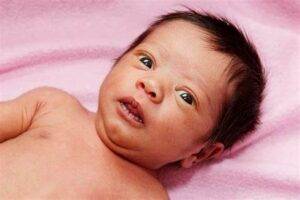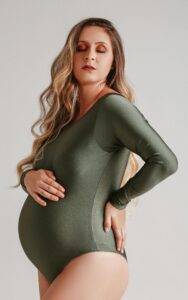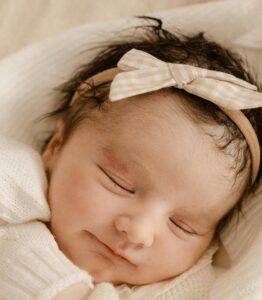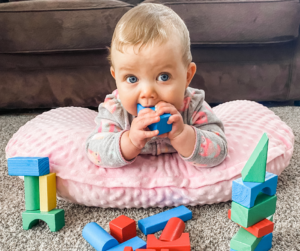When you first meet your baby, you might be in awe of those tiny fingers and toes, their delicate little face, and, to your surprise, a full head of hair! Some newborns arrive with thick, dark hair, while others are born bald or with a fine layer of peach fuzz. If your newborn is one of the babies blessed with a full head of hair, you might have questions—why is my newborn baby with hair? Why do some babies have so much hair at birth? Does it mean anything about their health? And how should you care for it?
Understanding what it means when your newborn has hair and learning how to care for it makes you confident as a parent. Below, we’ll explore the fascinating reasons why some babies are born with a head full of hair, whether it will last, and most importantly, how to take care of your little one’s precious locks.
Why Does a Newborn Baby Have Hair?
The Biology of Hair Development in the Womb
To understand why your newborn has hair, let’s first look at how hair develops during pregnancy. Hair follicles start forming as early as 9 weeks gestation, and by 14 weeks, the first tiny strands of hair, called lanugo, appear. Lanugo is fine, with downy hair covering a baby’s body while still in the womb.
Lanugo isn’t permanent but serves a temporary role—helping to regulate the baby’s body temperature and protect their skin. Around 28-32 weeks gestation, most of the lanugo begins to shed, although some babies are still born with patches of it, especially if they are born prematurely. As your baby approaches birth, they will begin growing the hair you see on their head, though not all babies will have the same amount.
Genetics: The Biggest Predictor of Hair at Birth
Genetics plays the largest role in whether a baby is born with a full head of hair. If you or your partner were born with a lot of hair, your baby would follow suit. Additionally, some ethnic backgrounds are more likely to produce babies with thick hair at birth, while other babies may be born with little to none.
Interestingly, the color and texture of the hair your baby is born with may not be the hair they have later in life. Hair color and texture can change dramatically in the first few years of life. It’s common for babies born with dark hair to grow blonde or light brown hair, or for straight hair to become curly as they grow.
The Role of Hormones in Hair Growth
While genetics play a crucial role in hair development, hormones also contribute. During pregnancy, your body produces higher levels of estrogen, which helps stimulate hair growth, both in you and your baby. This hormone surge is responsible for making your hair appear thicker and fuller during pregnancy, and it has a similar effect on your baby in the womb. After birth, both you and your baby experience a drop in hormone levels. For many mothers, this can lead to postpartum hair shedding.
Similarly, babies often lose some or all of their hair in the first few months of life due to hormones known as telogen effluvium. It’s perfectly normal for babies to shed their hair during this time; in most cases, it will grow back.
Newborn Baby With Hair: Is It Normal?
Yes, it’s normal for newborns to be born with hair. Just as it’s normal for some babies to be born with no hair at all. Every baby is unique, and the amount of hair they have at birth is one of the many variations in newborn appearance. A newborn baby with hair doesn’t indicate anything unusual about their health.
Likewise, a baby without hair isn’t less healthy or less developed. While the amount of hair at birth may vary, all babies follow the same basic hair growth cycle. The hair follicles formed in the womb are the same follicles that will produce hair throughout their life. However, the hair they’re born with might shed, only to be replaced by a new type of hair later.
How to Care for a Newborn’s Hair
Whether your baby has a few soft strands or a full head of hair, caring for newborn hair requires a delicate touch. Here’s a step-by-step guide on how to care for your baby’s hair and scalp gently and effectively.
1. Keep It Clean with Gentle Shampoo
Newborn hair doesn’t need to be washed every day. Overwashing dries their scalp. Aim to wash your baby’s hair 2-3 times a week. Use a gentle baby shampoo that’s free of harsh chemicals. Look for shampoos labeled as “tear-free” and designed for sensitive skin. Here’s how to wash your newborn’s hair:
- Wet your baby’s hair and scalp with warm water.
- Apply a small amount of shampoo and gently massage it into their scalp using your fingertips.
- Rinse thoroughly with warm water, ensuring no shampoo is left behind, which can irritate the scalp.
2. Gently Brush Your Baby’s Hair
Brushing your baby’s hair after washing keeps it tangle-free and distributes natural oils from the scalp. Use a soft-bristled baby brush or a wide-toothed baby comb to avoid pulling on the hair or irritating the scalp. Use a baby-safe detangler or leave-in conditioner for curly or textured baby’s hair. Use products designed for babies, as their skin is far more sensitive than adults.
3. Moisturize the Scalp if Needed
If your baby’s scalp seems dry or flaky, apply a small amount of baby oil or natural oils like coconut or almond oil. Gently massage the oil into their scalp, then comb to distribute it evenly. This soothes a dry scalp and keeps the hair soft. Avoid using heavy oils or products that clog the pores, as a baby’s scalp is sensitive and easily irritates.
4. Avoid Overwashing or Over Styling
It can be tempting to style your baby’s hair, especially if they have a full head of curls or thick locks. However, it’s best to keep things simple. Avoid using hair products like gels, hairsprays, or adult conditioners on newborns. Their scalp is still developing, and heavy products weigh the hair down and lead to irritation. Also, avoid putting tight headbands, ponytails, or clips in their hair, as this causes hair breakage or leads to traction alopecia, a condition where hair is pulled out due to excessive tension on the scalp.
How About Newborn Hair Loss–Baby’s Hair Falling Out
Many babies experience hair loss after birth, which is surprising for parents who see their baby’s beautiful hair gradually disappear. Newborn hair loss, or telogen effluvium, is common in the first few months of life. Hormonal shifts after birth cause hair shedding in newborns. While it’s concerning your baby’s hair thinning or falling out, rest assured that this is a normal part of the hair growth cycle.
During pregnancy, high hormone production keeps your baby’s hair in the anagen or growth phase, which explains why many babies are born with a full head of hair. After birth, these hormone levels drop, and hair enters the telogen or resting phase. As a result, many babies shed some or all of their hair during the first few months.
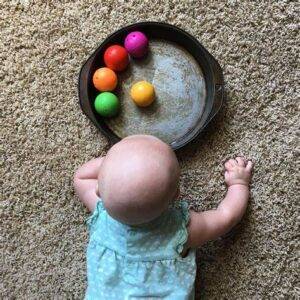
New hair begins to grow in its place, though the new hair may be a different texture, color, or thickness than the hair your baby was born with. For example, a baby with dark, straight hair might grow lighter, curlier hair later. This is completely normal and part of your baby’s development. Here are some things to know about newborn hair loss:
- It’s temporary: Most babies who lose their hair in the first few months begin to grow it when they reach 6 months to a year. The new hair may have a different texture or color than the hair they were born with.
- Avoid friction: If your baby spends a lot of time lying on their back, the hair on the back of their head may rub off. Reduce this by gently repositioning your baby’s head or giving them tummy time.
- Consult your pediatrician if needed: If your baby’s hair loss seems excessive, or if you notice any bald patches or redness on the scalp, consult your pediatrician. While most newborn hair loss is normal, conditions like alopecia or infections are also considered.
What Is Cradle Cap and How Do You Treat It?
Cradle cap, or seborrheic dermatitis, is a common skin condition in newborns that causes flaky, scaly patches on the scalp. It looks like thick, yellowish scales or crusts, and although it’s concerning, it doesn’t cause discomfort for your baby. Excess oil produced in the scalp and leftover hormones from pregnancy are the causes. Poor hygiene is not to be blamed for this condition. It clears up by itself within the first few months of life. Here’s how to manage:
- Gently brush the scales: Use a soft baby brush to loosen and remove the flaky skin. Avoid scrubbing too hard, as the scalp is sensitive.
- Apply oil before shampooing: Massage a small amount of either baby oil, coconut oil, or olive oil onto your baby’s scalp to soften the scales before washing. Let it sit for 10-15 minutes, then gently wash it with a mild shampoo.
- Use medicated shampoo: If the cradle cap doesn’t improve with regular shampooing and oil treatments, consult your pediatrician, who may recommend a medicated shampoo formulated for babies.
Newborn Hair Myths: Separating Fact from Fiction
Does Heartburn During Pregnancy Mean Your Baby Will Have Hair?
One of the most commonly heard myths is that the more heartburn you experience during pregnancy, the more hair your baby will have. Surprisingly, there’s truth to this claim. A 2006 published study found that women who reported moderate to severe heartburn during pregnancy were more likely to have babies with lots of hair. This is believed to be the role of pregnancy hormones, which cause hair growth in babies and relax the valve between the stomach and esophagus, leading to heartburn.
While the study is intriguing, note that not every case of heartburn during pregnancy will result in a baby with a full head of hair. Likewise, many babies with a lot of hair are born to mothers with little to no heartburn.
Does the Amount of Hair at Birth Determine Hair Growth Later in Life?
Another myth is that babies born with lots of hair will always have thick, fast-growing hair. In reality, the amount of hair a newborn has at birth doesn’t predict how their hair will look later in life. Many babies lose the hair they’re born with, only to grow a completely different color or texture later in life. This is largely due to the natural hair growth cycle and the hormonal changes after birth.
You Shouldn’t Cut a Baby’s Hair Before Their First Birthday
Some parents hesitate to cut their baby’s hair, especially before their first birthday. They believe that it could stunt hair growth or bring bad luck. In reality, cutting your baby’s hair doesn’t impact their hair growth. Hair grows from the follicles in the scalp, not from the ends, so cutting your baby’s hair won’t affect how fast or thick it grows.
Take Care of Your Newborn Baby with Hair
A newborn baby with hair is one of the many delightful surprises of parenthood. Whether your little one has a head full of dark curls or a few wispy strands, it’s all part of their development. Understanding the factors that influence newborn hair growth and taking a gentle approach to care, ensures your baby’s hair and scalp stay healthy.
Every baby is different. Hair may come and go during the first year, but with patience and love, you’ll navigate this phase confidently. And whether they have a full head of hair or just a little, your baby is perfect just the way they are.
Check out these articles for related topics on Omega Pediatrics reading resources:

